Ghostbusters
 Just in time for Halloween, Activision releases the Ghostbusters cartridge for the Atari 2600 home video game system, based on the hit movie of the same name.
Just in time for Halloween, Activision releases the Ghostbusters cartridge for the Atari 2600 home video game system, based on the hit movie of the same name.
Pitfall II: Lost Caverns
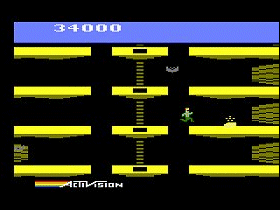 Activision releases the Pitfall II: Lost Caverns cartridge for the Atari 2600 home video game system, adding new adventures to Pitfall Harry’s resume and wowing players with sophisticated polyphonic music from a console infamous for its buzzes, bleeps and bloops. (The secret: the cartridge contains its own special audio chip.)
Activision releases the Pitfall II: Lost Caverns cartridge for the Atari 2600 home video game system, adding new adventures to Pitfall Harry’s resume and wowing players with sophisticated polyphonic music from a console infamous for its buzzes, bleeps and bloops. (The secret: the cartridge contains its own special audio chip.)
Space Shuttle: A Journey Into Orbit
 Activision releases the Space Shuttle cartridge for the Atari 2600 home video game system, an attempt to do a realistic flight simulator on limited hardware. Many of the console’s option switches – normally used to toggle difficulty levels, color or black & white graphics, and so on – are used for in-game functions instead.
Activision releases the Space Shuttle cartridge for the Atari 2600 home video game system, an attempt to do a realistic flight simulator on limited hardware. Many of the console’s option switches – normally used to toggle difficulty levels, color or black & white graphics, and so on – are used for in-game functions instead.
Pressure Cooker
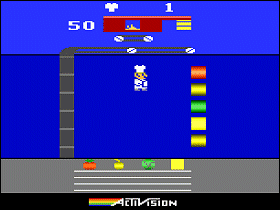 Activision releases the Pressure Cooker cartridge for the Atari 2600 home video game system. A fast-paced video game version of the fast food industry, Pressure Cooker turns players into short-order cooks with very little time to accurately build burgers to order.
Activision releases the Pressure Cooker cartridge for the Atari 2600 home video game system. A fast-paced video game version of the fast food industry, Pressure Cooker turns players into short-order cooks with very little time to accurately build burgers to order.
Robot Tank
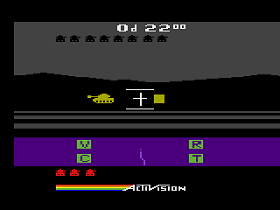 Activision releases the Robot Tank cartridge for the Atari 2600 home video game system, Activision’s answer to Atari’s home verison of Battlezone. As usual, Activision raises the ante with such features as a night vision mode and multiple targets.
Activision releases the Robot Tank cartridge for the Atari 2600 home video game system, Activision’s answer to Atari’s home verison of Battlezone. As usual, Activision raises the ante with such features as a night vision mode and multiple targets.
Sorcerer
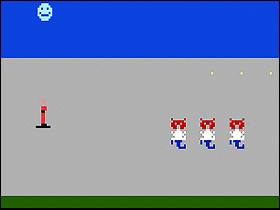 Upstart video game manufacturer Mythicon releases Sorcerer for the Atari 2600. One of only three games issued by Mythicon before it goes out of business, and considered one of the worst games ever made for the 2600, Sorcerer is designed to be sold at a low price point at drug stores and other retail venues not normally associated with video games.
Upstart video game manufacturer Mythicon releases Sorcerer for the Atari 2600. One of only three games issued by Mythicon before it goes out of business, and considered one of the worst games ever made for the 2600, Sorcerer is designed to be sold at a low price point at drug stores and other retail venues not normally associated with video games.
Atari sues Coleco over Atari compatibility
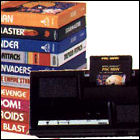 With sales of the Atari 5200 console already seriously impacted by the rival Colecovision video game system, and perhaps hoping to distract from a potentially alarming earnings statement issued the same day, Atari files suit against Coleco over the first add-on produced for Colecovision: Expansion Module #1, which allows Colecovision owners to play Atari 2600 games (and entices 2600 owners to trade up to Colecovision, since their existing game libraries won’t automatically become useless). Atari sues for patent infringement, while Coleco immediately countersues, claiming that Atari is violating antitrust and monopoly laws.
With sales of the Atari 5200 console already seriously impacted by the rival Colecovision video game system, and perhaps hoping to distract from a potentially alarming earnings statement issued the same day, Atari files suit against Coleco over the first add-on produced for Colecovision: Expansion Module #1, which allows Colecovision owners to play Atari 2600 games (and entices 2600 owners to trade up to Colecovision, since their existing game libraries won’t automatically become useless). Atari sues for patent infringement, while Coleco immediately countersues, claiming that Atari is violating antitrust and monopoly laws.
More about Colecovision in Phosphor Dot Fossils
Cosmic Creeps
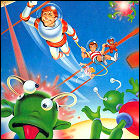 Telesys releases the video game cartridge Cosmic Creeps for the Atari 2600 home video game system, just in time for the Christmas buying season. A glut of new releases for the 2600 by the end of the year, many from third-party companies like Telesys, causes some consumer confusion which has unexpected consequences for the entire industry.
Telesys releases the video game cartridge Cosmic Creeps for the Atari 2600 home video game system, just in time for the Christmas buying season. A glut of new releases for the 2600 by the end of the year, many from third-party companies like Telesys, causes some consumer confusion which has unexpected consequences for the entire industry.
Fast Food
 Telesys releases the video game cartridge Fast Food for the Atari 2600 home video game system, just in time for the Christmas buying season. A glut of new releases for the 2600 by the end of the year, many from third-party companies like Telesys, causes some consumer confusion which has unexpected consequences for the entire industry.
Telesys releases the video game cartridge Fast Food for the Atari 2600 home video game system, just in time for the Christmas buying season. A glut of new releases for the 2600 by the end of the year, many from third-party companies like Telesys, causes some consumer confusion which has unexpected consequences for the entire industry.
Swordquest: Earthworld
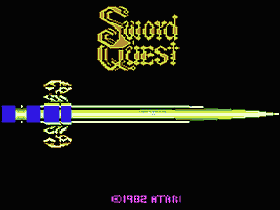 Now that video game “easter eggs” – secret messages hidden in the games by their designers – are public knowledge, Atari releases its first game in which finding these messages is an integral part of the game. Swordquest: Earthworld kicks off a four-game cycle whose hidden secrets, when found, will allow the first player sharp enough to find and decipher the clues to claim a prize. A downturn in Atari’s financial fortunes will keep the contest from being completed, and the fourth game is never actually released.
Now that video game “easter eggs” – secret messages hidden in the games by their designers – are public knowledge, Atari releases its first game in which finding these messages is an integral part of the game. Swordquest: Earthworld kicks off a four-game cycle whose hidden secrets, when found, will allow the first player sharp enough to find and decipher the clues to claim a prize. A downturn in Atari’s financial fortunes will keep the contest from being completed, and the fourth game is never actually released.
Megamania!
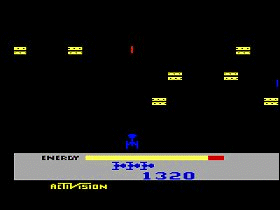 Activision releases the Megamania! cartridge for the Atari VCS home video game system. Inspired by the arcade game Astro Blaster, and subtitled “A Space Nightmare”, Megamania! pits players against airborne bow ties and hamburgers – and their own energy management skills. A national TV ad campaign featuring The Tubes heralds the game’s arrival.
Activision releases the Megamania! cartridge for the Atari VCS home video game system. Inspired by the arcade game Astro Blaster, and subtitled “A Space Nightmare”, Megamania! pits players against airborne bow ties and hamburgers – and their own energy management skills. A national TV ad campaign featuring The Tubes heralds the game’s arrival.
Pitfall!
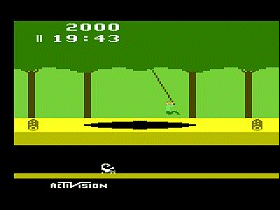 Activision releases the Pitfall! cartridge for the Atari VCS home video game system. Subtitled “The Adventure of Pitfall Harry” (implying that further adventures are yet to come), this becomes one of the Atari VCS’ “killer app” games, and is ported to other systems and updated for more modern platforms for decades to come.
Activision releases the Pitfall! cartridge for the Atari VCS home video game system. Subtitled “The Adventure of Pitfall Harry” (implying that further adventures are yet to come), this becomes one of the Atari VCS’ “killer app” games, and is ported to other systems and updated for more modern platforms for decades to come.
Math Gran Prix
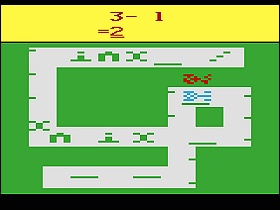 Atari releases its “edutainment” cartridge Math Gran Prix for the Atari VCS, a title designed to stave off critics of video games’ negative effects on kids’ schoolwork. Perhaps predictably, Math Gran Prix fails to cross the retail finish line – the same parents complaining that the Atari is keeping homework from getting done aren’t buying educational games for it.
Atari releases its “edutainment” cartridge Math Gran Prix for the Atari VCS, a title designed to stave off critics of video games’ negative effects on kids’ schoolwork. Perhaps predictably, Math Gran Prix fails to cross the retail finish line – the same parents complaining that the Atari is keeping homework from getting done aren’t buying educational games for it.
Imagic releases second wave of games
 Imagic, recently formed from another wave of ex-Atari employees, releases its second wave of game cartridges for the Atari VCS, including Atlantis, Cosmic Ark, Fire Fighter and the adventure game Riddle Of The Sphinx.
Imagic, recently formed from another wave of ex-Atari employees, releases its second wave of game cartridges for the Atari VCS, including Atlantis, Cosmic Ark, Fire Fighter and the adventure game Riddle Of The Sphinx.
Chopper Command
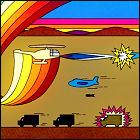 Activision releases the Chopper Command cartridge for the Atari VCS home video game system. Inspired by the arcade game Defender, complete with a “radar view” of areas of the playfield extending beyond the edges of the screen, Chopper Command proves to be graphically superior to Atari’s own home version of that game.
Activision releases the Chopper Command cartridge for the Atari VCS home video game system. Inspired by the arcade game Defender, complete with a “radar view” of areas of the playfield extending beyond the edges of the screen, Chopper Command proves to be graphically superior to Atari’s own home version of that game.
Pac-Man comes home
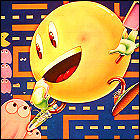 After an extremely short development period and industry insider warnings that the finished product wasn’t ready for prime time, Atari’s home version of Pac-Man for the Atari VCS arrives in stores, selling record numbers… and, within weeks, becomes the subject of bad word-of-mouth and critical slams on its weak game play and graphics. At the urging of Atari CEO Ray Kassar, Pac-Man‘s print run exceeds the number of VCS consoles sold to date, since it’s anticipated that the Pac-crazed public will buy the console simply because Pac-Man is available for it.
After an extremely short development period and industry insider warnings that the finished product wasn’t ready for prime time, Atari’s home version of Pac-Man for the Atari VCS arrives in stores, selling record numbers… and, within weeks, becomes the subject of bad word-of-mouth and critical slams on its weak game play and graphics. At the urging of Atari CEO Ray Kassar, Pac-Man‘s print run exceeds the number of VCS consoles sold to date, since it’s anticipated that the Pac-crazed public will buy the console simply because Pac-Man is available for it.
The Empire Strikes Home
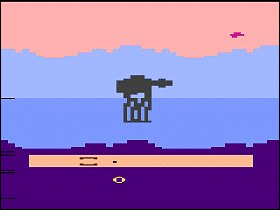 Released a couple of years after the movie that inspired it, Parker Brothers’ The Empire Strikes Back for the Atari VCS is the very first Star Wars video game to hit the market. Though games inspired by the movies have been appearing since the first film was still in theaters, this is the first game officially licensed by Lucasfilm. It pits players against an endless onslaught of Imperial Walkers (and unlike the movie’s rebels, the player has no chance of surviving indefinitely).
Released a couple of years after the movie that inspired it, Parker Brothers’ The Empire Strikes Back for the Atari VCS is the very first Star Wars video game to hit the market. Though games inspired by the movies have been appearing since the first film was still in theaters, this is the first game officially licensed by Lucasfilm. It pits players against an endless onslaught of Imperial Walkers (and unlike the movie’s rebels, the player has no chance of surviving indefinitely).
More about Star Wars video games in Phosphor Dot Fossils
Hear about it on the Sci-Fi 5 podcast
Demon Attack and other Imagic firsts
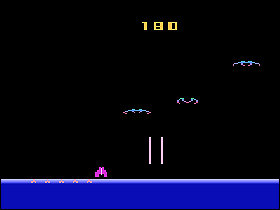 Imagic, recently formed from a group of ex-Atari programmers, releases its first wave of cartridges for the Atari VCS home video game system. The first group of games includes Demon Attack, the pool game Trick Shot and the first-person space flight sim Star Voyager. With silver foil boxes and game artwork utilizing miniature models, the Imagic games have a distinctive look on the store shelves, and the games themselves quickly acquire the company a good reputation..
Imagic, recently formed from a group of ex-Atari programmers, releases its first wave of cartridges for the Atari VCS home video game system. The first group of games includes Demon Attack, the pool game Trick Shot and the first-person space flight sim Star Voyager. With silver foil boxes and game artwork utilizing miniature models, the Imagic games have a distinctive look on the store shelves, and the games themselves quickly acquire the company a good reputation..
Yars’ Revenge
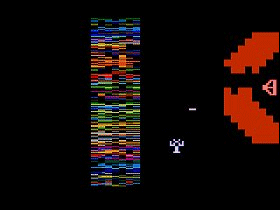 Atari releases the original title Yars’ Revenge for the Atari VCS home video game console. Despite not being a port of a popular arcade game (though it started out as an attempt to port Star Castle to the VCS), Yars’ Revenge sells well thanks for favorable reviews and good word-of-mouth. A pack-in comic from DC Comics, “Yars’ Revenge: The Qotile Ultimatum”, is included.
Atari releases the original title Yars’ Revenge for the Atari VCS home video game console. Despite not being a port of a popular arcade game (though it started out as an attempt to port Star Castle to the VCS), Yars’ Revenge sells well thanks for favorable reviews and good word-of-mouth. A pack-in comic from DC Comics, “Yars’ Revenge: The Qotile Ultimatum”, is included.
Defender
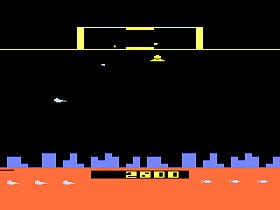 Atari releases the home version of the arcade hit Defender as a cartridge for the Atari VCS home video game system. Though the game undergoes major alterations to fit within the VCS’ memory, Defender sells well. It includes the first issue of a tie-in comic book, Atari Force, created by DC Comics (a subsidiary of Warner Communications, just like Atari).
Atari releases the home version of the arcade hit Defender as a cartridge for the Atari VCS home video game system. Though the game undergoes major alterations to fit within the VCS’ memory, Defender sells well. It includes the first issue of a tie-in comic book, Atari Force, created by DC Comics (a subsidiary of Warner Communications, just like Atari).
Berzerk
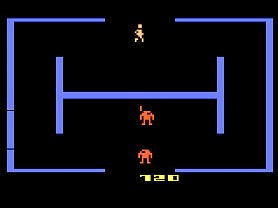 Atari releases the home version of the arcade hit Berzerk as a cartridge for the Atari VCS home video game system. Almost a dead ringer for the graphically simple arcade game, the console port is only missing the distinctive Cylon-esque voice synthesis of the coin-op. The second issue of the Atari Force comic from fellow Warner Communications subsidiary DC Comics is packed-in with Berzerk.
Atari releases the home version of the arcade hit Berzerk as a cartridge for the Atari VCS home video game system. Almost a dead ringer for the graphically simple arcade game, the console port is only missing the distinctive Cylon-esque voice synthesis of the coin-op. The second issue of the Atari Force comic from fellow Warner Communications subsidiary DC Comics is packed-in with Berzerk.
Activision class of ’81
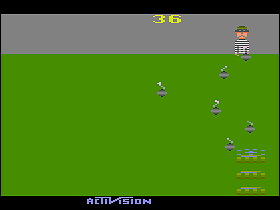 Activision releases a trio of cartridges for the Atari VCS home video game system: Kaboom!, Tennis and Laser Blast. Kaboom!, inspired by the ’70s arcade game Avalanche, proves to be the fast favorite of the three games.
Activision releases a trio of cartridges for the Atari VCS home video game system: Kaboom!, Tennis and Laser Blast. Kaboom!, inspired by the ’70s arcade game Avalanche, proves to be the fast favorite of the three games.
Missile Command
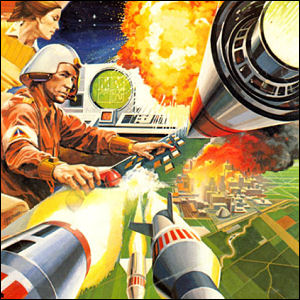 Atari releases the home version of Missile Command as a cartridge for the Atari 2600. The manual included with the game explains the missile attack as the product of an alien invasion, not Reagan-era Cold War tensions. Though the cartridge is an instant best-seller, its programmer receives a reward that convinces him to look for work somewhere other than Atari.
Atari releases the home version of Missile Command as a cartridge for the Atari 2600. The manual included with the game explains the missile attack as the product of an alien invasion, not Reagan-era Cold War tensions. Though the cartridge is an instant best-seller, its programmer receives a reward that convinces him to look for work somewhere other than Atari.
 Activision releases the
Activision releases the 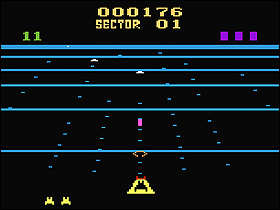 Activision releases the
Activision releases the 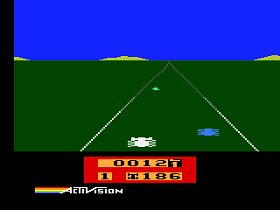 Activision releases the
Activision releases the 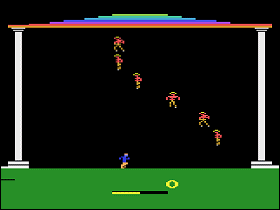 Imagic releases the
Imagic releases the  Activision releases the
Activision releases the 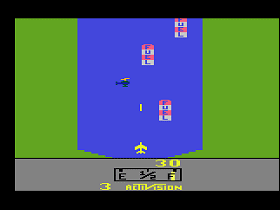 Activision releases the
Activision releases the  Atari releases the home version of the popular arcade game
Atari releases the home version of the popular arcade game